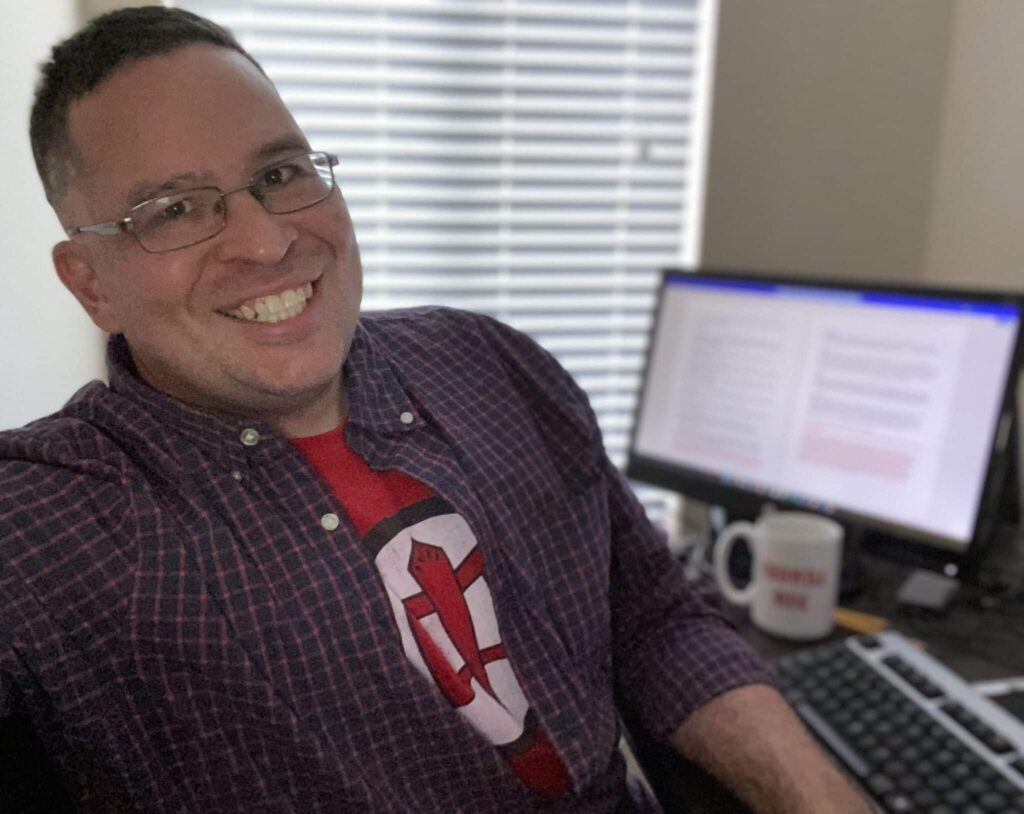I was an 80s kid and loved the show The Greatest American Hero. The theme song “Believe it or not, I’m walking on air….” still puts me in a good mood. In my opinion, Ralph Hinkley was very relatable and underrated as a superhero – he was a high school teacher who owned a red power suit which gave him superhuman strength and the ability to fly, but apparently, the suit couldn’t fix his clumsiness. My mom handcrafted me a similar red sweatshirt with the chest emblem which I wore often. It was my symbol of confidence and invincibility. One Saturday morning in the early 1980s I was running around pretending to fly, except this time I was doing so in a nearly vacant waiting room at the hospital with my dad while my mom had a lymph node biopsied in her neck. As I understood it, she had a simple “lump in the throat,” no big deal. My mom was in her mid-thirties and too young for anything to be wrong.
But she was diagnosed with lymphoma. She began chemotherapy and was frequently in and out of the hospital. Mom lost a significant amount of weight, all her hair, wore terrible wigs, and frequently napped – her health was fading quickly. I remember taking breaks from pretending to fly around the house to lay down beside her and tell her “It’s ok, mom.” I vividly remember the nap when I realized she wasn’t ok and turning over onto my side so mom wouldn’t see the tears streaming down my face – one of the most vulnerable moments of my life. The chemotherapy treatments weren’t working, and her doctor wanted to meet to discuss “goals” – the equivalent of a significant other saying, “We need to talk.” I hadn’t started school yet, so I frequently tagged along in the waiting room for appointments. After this appointment, we went to lunch at a burger joint that had an outdoor playground and I got to wear a paper crown. I couldn’t figure out why mom was crying at what I believed to be one of the happiest places on earth! At the time, I didn’t understand what was happening. My mom, dad, and aunt appeared to be having a serious conversation. Mom started a high-risk, aggressive (and experimental at the time) chemotherapy regimen, and we kids began spending more time with our aunt. We were all going to need a symbol of strength to get through this.
The details after that are fuzzy, perhaps even blocked out. Thankfully, mom survived because of the new chemotherapy treatment. But our family was forever changed after this experience. The first “why” people ask when cancer intrudes into their lives is “Why is this happening?” or “Why (insert name of loved one)?” I wish I knew or could respond to this unanswerable question. My mom tells us in her mind she repeatedly screamed at God, “Why did you do this?!” and apparently gave God some vague threats and ultimatums. During this experience, mom found her other “Why,” a reason to persevere through grueling chemotherapy treatments with no guarantee for survival. Her “Why” was our family; she wasn’t ready to leave us kids and our dad. It turns out, we were a part of her treatment care plan. There were strict policies about children visiting the inpatient units, but Mom’s physician stated visits with her children were essential for her recovery and wrote orders permitting us to visit.
Our family has always been mom’s “Why” during her cancer survivorship. She attended every awards assembly, school concert, and sporting event we were in, and occasionally became teary-eyed at these events (while us kids rolled our eyes…. again? seriously mom?). Mom continues to be her children and grandchildren’s biggest fan and advocate.
At the age of 35 years, I found myself wearing a patient gown, sitting in an exam room at my PCP office. My PCP palpated my neck, her fingers stopped, palpated again, and palpated once more – I had an enlarged lymph node at the base of my neck. “How old was your mom when she had lymphoma? I’d like to do some bloodwork.” NO! My stomach felt sick, and my hands were shaking – vulnerable again. This can’t be happening; I have daughters at home (3 and 5 years old). I had become complacent in my life, enjoying cruising through young adulthood without considering how lucky I was. The enlarged lymph node was benign but represented a turning point. What was my purpose and where was my “Why”?
Cancer has a lasting impact on all people who experience it and their loved ones. Nobody has a choice whether cancer becomes part of their life, but there are choices how to deal with its aftermath. I believe there are three choices: 1) Allow it to consume your mental energy, 2) Denial, or 3) Use the experience for motivation. Mom obviously picked choice three. By trying to forget our family’s experience I suppose I went with option number two. My benign lymph node made me consider option three.
I followed my mom’s example, and was intentional about attending as many of my kids’ activities as possible. In my nursing work, I spent more time talking to my patients, learning who they were as people before their illness. I’ve always considered it a gift when a patient shares a piece of themselves and trusts others with their stories. This interest transitioned into the pursuit of a Ph.D. focused on studying the concept of hope in adolescents and young adults (AYAs) who have advanced cancer. Helping AYAs process their experiences with advanced cancer and tell their stories became my passion.
I graduated with my Ph.D. in a small intimate ceremony due to COVID restrictions. Graduations were an occasion mom relished and would customarily cry a couple of tears and move on… except this time, the tears were mine. Mom lived to see me graduate and find my other “Why.”
By: C. Robert Bennett

